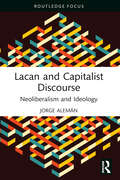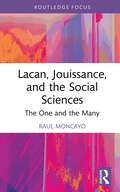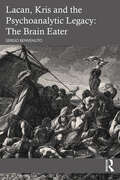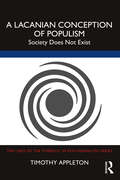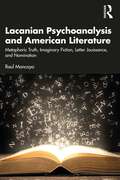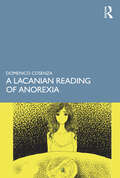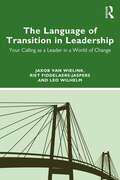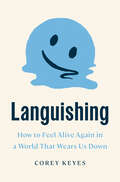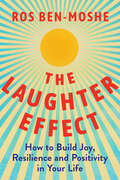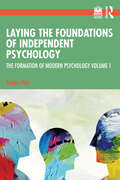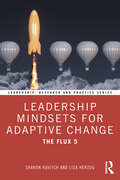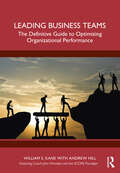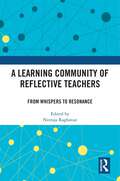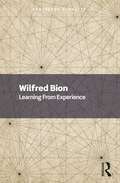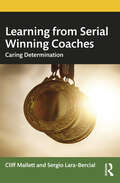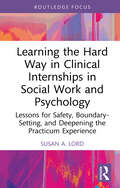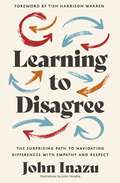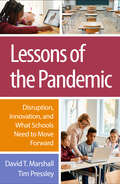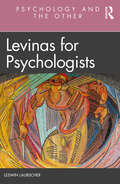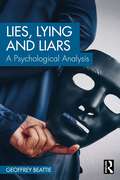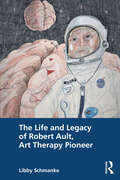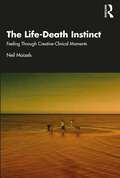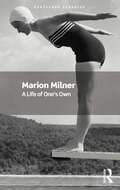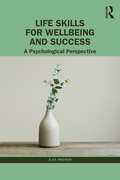- Table View
- List View
Lacan and Capitalist Discourse: Neoliberalism and Ideology
by Jorge AlemánLacan and Capitalist Discourse explores the political and theoretical connections between the Covid-19 Pandemic and Capitalism, unravelling the direct consequences of Lacan's thesis of so-called "Capitalist Discourse”. Jorge Alemán provides an account of neoliberalism, its mechanisms to produce subjectivities and the new modes of the political far Right. The book begins with the problem of a possible exit from capitalism, continuing to consider the possibilities of mourning and the active production of a new Left. Alemán engages deeply with a range of thinkers: primarily Lacan, but also Heidegger, Marx, Laclau, Foucault, Butler, Badiou, Althusser, and others, in making his case. Lacan and Capitalist Discourse will be of great interest to psychoanalysts and to academics of psychoanalytic and Lacanian studies, cultural theory, philosophy and political thought.
Lacan, Jouissance, and the Social Sciences: The One and the Many (Routledge Focus on Mental Health)
by Raul MoncayoExploring how a Freudian-Lacanian approach to psychoanalysis intersects with social and cultural theory, Lacan, Jouissance, and the Social Sciences demonstrates the significance of subjectivity as a concept for the study of leadership, social psychology, culture, and political theory. Raul Moncayo examines Lacan’s notion of surplus jouissance in relation to four types of socio-economic value: Productive Value, Exchange Value, Surplus Value, and Profit. Also drawing on the work of Slavoj Žižek, Moncayo contends that surplus production cannot be reduced to alienated labor but rather includes various levels of jouissance-value. In this way, the jouissance that drives capitalization and organization can be theorized as constructive rather than destructive and encompass satisfaction and prosperity rather than individual suffering and asceticism or living with less. This volume will be of great interest to psychoanalysts both in practice and in training and to academics and scholars of psychoanalytic studies, Lacanian studies, and social sciences.
Lacan, Kris and the Psychoanalytic Legacy: The Brain Eater
by Sergio BenvenutoLacan, Kris and the Psychoanalytic Legacy: The Brain Eater examines the case of a scholar which was commented on by three leading psychoanalysts of the 20th century: Melitta Schmideberg, Ernst Kris, and Jacques Lacan. Sergio Benvenuto unpicks the complex case history of the patient he calls "Professor Brain", a man who struggled to publish his research because of his fixation on plagiarism, and who has never been identified. Benvenuto reconstructs the case through the first-hand accounts of the patient’s analysts and Lacan and sets it in the context of mid-century psychoanalytic debate. As we progress through the patient’s story, Benvenuto explains Lacan’s theories as they apply to the case: the "foreclosure" of orality; obsessional neurosis; mental anorexia; and, above all, the reasons for his opposition to Ego psychology, of which Kris was one of the most important representatives. This book will be of great interest to psychoanalysts in practice and in training, psychiatrists and clinical psychologists. It will also be of interest to academics and scholars of philosophy, the history of psychoanalysis, literature, and cultural studies.
A Lacanian Conception of Populism: Society Does Not Exist
by Timothy AppletonA Lacanian Conception of Populism takes issue with traditional theories of populism, which seek to equate populism with hegemony, arguing that these are not only different but even incompatible logics. Timothy Appleton contends that one of the main differences between populism and hegemony has to do with the social totality: while hegemony absolutises it, populism eviscerates it, setting in its place an (apparently paradoxical) dispersion of singular instances of ‘the people’. The book considers the work of Laclau, Badiou, Žižek and Rancière, before arriving at a novel conceptualisation that Appleton dubs ‘the populism of singularities’. In the second half of the book, the author draws out the consequences of this concept for contemporary political theory: the question of how to define ‘left’ and ‘right’; the question of popular enthusiasm and affect; ‘truth’ versus ‘post-truth’; the question of leadership; populism and nationalism; and the relation between populism and political parties. A Lacanian Conception of Populism will be key reading for academics and scholars of political theory, political philosophy, post-Marxist thought, discourse theory and psychoanalysis. It will also be of interest to those working in the areas of populism studies, cultural studies, gender studies and queer theory.
Lacanian Psychoanalysis and American Literature: Metaphoric Truth, Imaginary Fiction, Letter Jouissance, and Nomination
by Raul MoncayoLacanian Psychoanalysis and American Literature considers the psychoanalytic applications of three classic works of nineteenth-century literature, applying Lacanian concepts throughout. Moncayo imports the dynamisms and texture of three English and American stories with the aim of developing psychoanalytic theory, rather than simply confirming or applying previously adopted psychoanalytic concepts and theory. The author begins with The Purloined Letter by Edgar Allan Poe, assessing the differences between Derrida and Lacan’s analysis of this famous story. The book then considers The Turn of the Screw by Henry James, using James’ text for an in-depth analysis of Lacan’s Seminar on the Logic of the Fantasy, and Wuthering Heights by Emily Brontë, considering "passage à l'acte," and the objet a as the Wind and Heart of the Signifier. The authors use Lacan’s later theories to cast a new interpretative light on the stories, much as Lacan himself did with the work of James Joyce. Lacanian Psychoanalysis and American Literature will be of interest to academics and scholars of literary studies, psychoanalytic and Lacanian studies and Philosophy.
A Lacanian Reading of Anorexia
by Domenico CosenzaThis book presents a Lacanian perspective on the understanding and treatment of anorexia, supported by case material, research and theoretical insight from the author’s 25 years of clinical practice. Domenico Cosenza explains how anorexia constitutes a challenge for contemporary psychoanalytic clinicians, assesses previous theoretical understandings and examines clinical contributions from other schools of psychoanalysis. Cosenza argues that anorexia cannot be treated by following a classical psychoanalytic path, and here draws on numerous clinical cases to articulate a Lacanian approach which addresses core concerns not resolved elsewhere. Elaborating on Lacanian concepts including refusal and the object nothing, Cosenza offers a new approach for all psychoanalytically-informed clinicians working with anorexia. A Lacanian Reading of Anorexia will be of great interest to psychoanalysts, psychiatrists, clinical psychologists and psychotherapists interested in Lacanian perspectives and the dynamic-analytical approach in the treatment of anorexia.
The Language of Transition in Leadership: Your Calling as a Leader in a World of Change
by Jakob van Wielink Riet Fiddelaers-Jaspers Leo WilhelmIn this book, the authors utilise their decades of experience in leadership and coaching for change to help leaders develop the necessary skills to lead people and organisations in transition. Combining a scientific and practice-based approach, they show readers how to develop and maintain their own impactful leadership style while creating psychological safety in their teams. Leadership that achieves sustainable results comes from connecting past, present and future. Describing leadership as a journey, the book invites the reader to discover their calling and realise the importance of examining the roots of their leadership, before thinking about its destination. It gives leaders access to a new dimension of unprecedented growth and demonstrates the ways these lessons and skills can transform change into lasting transitions. Accessible and written in a lively style, The Language of Transition in Leadership is an important book for leaders and executives. It will also be of interest to coaches, organisational advisors, management consultants, students of leadership and those transitioning into the workforce.
Languishing: How to Feel Alive Again in a World That Wears Us Down
by Corey Keyes&“With his pioneering research, Corey Keyes put languishing on the map. In this powerful book, he brings it to life. Get ready to rethink your understanding of mental health, update your views on happiness, and come closer to realizing your potential.&”—Adam Grant, #1 New York Times bestselling author of Hidden PotentialIf you&’re muddling through the day in a fog, often forgetting why you walked into a room . . . If you feel emotionally flattened, lacking the energy to socialize or feel joy in the small things . . . If you feel an inner void—like something is missing, but you aren&’t sure what . . . Then this book is for you.Languishing—the state of mental weariness that erodes our self-esteem, motivation, and sense of meaning—can be easy to brush off as the new normal, especially since indifference is one of its symptoms. It is not a synonym for depression and its attendant state of prolonged sadness. Languishers are more likely to feel out of control of their lives, uncertain about what they want from the future, and paralyzed when faced with decisions. Left unchecked, languishing not only impedes our daily functioning but is a gateway to serious mental illness and early mortality.Emory University sociologist Corey Keyes has spent his career studying the causes and costs of languishing—the neglected middle child of mental health. Now Keyes has written the first definitive book on the subject, examining the ripple effect of languishing on our lives before deftly diagnosing the larger forces behind its rise: the false promises of the self-help industrial complex, a global moment of intense fear and loss, and a failing healthcare system focused on treating rather than preventing illness.Ultimately, Keyes presents a counterintuitive approach to breaking the cycles keeping us stuck and finding a path to true flourishing. Unlike self-improvement systems offering quick-fix mood boosts, his framework focuses on functioning well: taking simple but powerful steps to hold our emotions loosely, becoming more accepting of ourselves and others, and carving out daily moments for the activities that create cycles of meaning, connection, and personal growth.Languishing is a must-read for anyone tempted to downplay feelings of demotivation and emptiness as they struggle to haul themselves through the day, and for those eager to build a higher tolerance for adversity and the pressures of modern life. We can expand our vocabulary for describing our inner experiences and deepest needs—and, with it, our potential to flourish.
The Laughter Effect: How to Build Joy, Resilience, and Positivity in Your Life
by Ros Ben-MosheLaughter really can be the best medicine, and in this transformative body-mind guide, acclaimed wellness expert Ros Ben-Moshe shares the prescription.In The Laughter Effect, Ros Ben-Moshe provides a roadmap to tap into the lighter side of life with laughter therapy. Ben-Moshe shares tips and tools to achieve an intentional state of being she calls the Laughter Effect–a way to elevate mindfulness, gratitude, and self-compassion. When used regularly, it enhances resilience to stress, enabling you to respond to adversity and bounce forward with humor, levity, and grace. Drawing on research from around the world, practice and wisdom from humor and laughter therapy, and positive psychology and neuroscience, Ben-Moshe shows you how to use the energy of laughter and joy to counter stress hormones and stimulate a daily dose of positive wellbeing with &“happy hormones.&”The techniques, strategies and practices you&’ll learn can transform your physical, mental, social and emotional landscape. Viewing life through a laughter lens will awaken a positive change in yourself, how you respond to the world and, in turn, how the world responds to you.
Laying the Foundations of Independent Psychology: The Formation of Modern Psychology Volume 1 (The Formation of Modern Psychology)
by Csaba PléhPart of a two-volume series, this book offers a multicentric perspective on the history of psychology, situating its development in relation to developments made in other social sciences and philosophical disciplines. This first volume, Laying the Foundations of Independent Psychology, provides a detailed exploration of the origins and development of European psychology. The book examines psychology’s beginnings as an independent discipline in the late 19th century through to the emergence of the dominant new schools of behaviorism, Gestalt psychology and psychoanalysis in the early 1900s. This volume also offers a broad overview of the early impact of Darwinism, not only on the psychological study of individual differences and on American functionalism, but also on the early evolutionary treatments of cognition in William James, James Baldwin, Ernst Mach and even Sigmund Freud. Taking this wider perspective, the book shows that European psychology was continuously present and active, placing these European developments in their own context in their own time. An invaluable introductory text for undergraduate students of the history of psychology, the book will also appeal to postgraduates, academics and those interested in psychology or the history of science, as well as graduate students of psychology, biology, sociology and anthropology with a theoretical interest.
Leadership Mindsets for Adaptive Change: The Flux 5 (Leadership: Research and Practice)
by Sharon Ravitch Liza HerzogThis informative and practical book helps leaders develop adaptive leadership mindsets and skills to address the myriad intersecting challenges shaping today’s workplace. Through the Flux 5 framework, organizational culture and systems experts Sharon Ravitch and Liza Herzog help leaders, teams, and organizations create the organizational conditions to drive and enact adaptive change. At a time of unprecedented workplace flux, leader roles are constantly being redefined, requiring more finely attuned leader mindsets, frames for leadership, and skillsets for moving the dial on individual and organizational sense-making for cultural and institutional excellence. Based on five mindsets – Inquiry Mindset, Humanizing Mindset, Systems Mindset, Entrepreneurial Mindset, and Equity Mindset – the Flux 5 framework teaches leaders to drive adaptive change as a tool of professional and organizational development. Using embedded leader learning activations and organizational practices, the book guides leaders to develop each mindset as they read. The book encourages leaders (and their organizations in diffusion effect) to cultivate a visionary and resonant leadership approach at the intersection of crisis leadership, professional and human development, systems thinking, entrepreneurial leadership, and organizational equity frameworks. Succinct, accessible, pragmatic, and inspiring, this useful guide will grab the interest of leaders, teams, and organizations across sectors, organizational types, and business contexts, and engage professors, students, and practitioners of leadership, management, organizational psychology, and organizational development.
Leading Business Teams: The Definitive Guide to Optimizing Organizational Performance
by William S. Kane Andrew HillIn a rapidly changing world, businesses must create a high-performing, metrics-driven workplace environment characterized by respect, inclusion, teamwork, innovation, and overall harmony—and it must be manageable and sustainable. This book shows that returning to managerial basics will provide the way forward, as exemplified by legendary UCLA basketball coach John Wooden, the model for a new people management pathway: the SCORE paradigm. Generally considered the greatest coach in history, John Wooden’s recipe for team success was unique, culture-based, and ahead of its time. Building upon Wooden’s 21 coaching principles and his own 35 years of experience as a human resources leader, Bill Kane has created the SCORE framework to guide people managers in creating and nurturing effective teams and steering their organizations through times of change: • Staffing: Attracting and selecting talent • Cultivating culture: Defining how people should interact • Organizing and planning: The need for direction and focus • Reinforcing desirable behavior: Managing performance • Engaging your team: A leader’s role and responsibility Enlivened with stories from the careers of Coach Wooden, Andy Hill (a three-time national champion under Coach), and the author, the book clearly explains why each coaching principle works in practice and provides examples of success, as well as pitfalls to avoid. Readers will learn how to get the right people on their team, create meaningful participative and inclusive management practices, build a winning organizational culture, and achieve heightened results. New and experienced people managers and leaders in corporate settings, as well as business and organizational psychology students, will appreciate this timeless reference tool, a roadmap to help people managers—as their own “work-in-progress”—develop strategies for success based upon a proven and simple model.
A Learning Community of Reflective Teachers: From Whispers to Resonance
by Neeraja RaghavanTeachers possess a wealth of untapped wisdom and valuable experience. Whether it’s in matter of educational policy, curriculum development or textbook selection, teachers carry a trove of information and insights to share. Traditionally, teacher development has been driven by administrators of schools, and it often takes the form of a ‘mentor’ teaching the staff of a school. But what happens when teachers across different locations collaborate and learn together? This volume documents such an initiative, sparked off by the Covid-19 pandemic, which brought people together online. It underscores the power of teachers debating, discussing, and learning from each other. Based on an Indian experience, the book addresses a range of issues teachers and educators face across the world — encompassing pedagogy, classroom management, school culture and teacher development. A unique story of community building and teacher education, this book also contains key outcomes and insights which take us through their action research projects and showcases a model of teacher development that can be adopted by interested readers. Above all, it brings out the crying need for a teacher’s voice to be heard — for far too long, teachers have been mere implementers of decisions taken by policy makers or managements of schools. By means of networking communities such as the one described in this book, the transformation of teachers going from whispers to resonance is greatly amplified. An important intervention in the domain of teacher development, this volume will be of great interest to students, researchers and practitioners of education, teacher education, and sociology of education. It will also be useful for teacher trainees, academicians, teacher educators, policymakers, schoolteachers, curriculum developers, teacher training institutes, and universities offering teacher education programs.
Learning From Experience (Routledge Classics)
by Wilfred R BionWilfred R. Bion was one of the foremost psychoanalysts of his generation, whose work has shaped and enriched psychoanalysis and psychotherapy indelibly. Renowned for some highly original and sometimes cryptic ideas, such as the alpha function and theory of the grid, Learning from Experience is arguably his most important and enduring work. Bion brings knowledge into the psychoanalytic spotlight. What forces, he asks, interfere with knowledge? Crucially, Bion doesn't mean knowing only facts, but the lifelong process of understanding and coming to know things that is a consequence of the development of knowledge. However, Learning From Experience is perhaps best-known for its emphasis on the way emotion and knowledge are interwoven. Bion links the emotional capacity to develop and know to the capacity to tolerate frustration: if we can hold ourselves in check whilst we endure frustration, then we can come to know things. A remarkable and brilliant work by a fascinating psychoanalyst and thinker, Learning From Experience continues to inspire psychoanalysis and psychotherapy. This Routledge Classics edition includes a new Foreword by Robert Hinshelwood.
Learning from Serial Winning Coaches: Caring Determination
by Cliff Mallett Sergio Lara-BercialLearning from Serial Winning Coaches provides performance coaches and directors, coach developers, and researchers with the knowledge and tools to affirm and challenge policy and practice and conduct further research to inform future policy and practice in the identification, recruitment, and development of performance coaches. Leading an athlete or team to an Olympic or world championship gold medal or professional league title is a great achievement for a coach; a dream that comes true for a small group of privileged coaches. This outstanding accomplishment can become the defining moment of their careers. Winning multiple golds and championships with different athletes or teams, and across multiple major events spanning decades, is the prerogative of an exclusive club of coaches. This book reveals the secrets, experiences, and practices of 17 of these coaches across 10 sports and 10 different countries. Through a combination of in-depth interviews with the coaches and their athletes and a detailed analysis of their personality and motivational profiles, Mallett and Lara-Bercial offer a unique portrait of the day-to-day workings of these coaches: who they are, how they operate, their leadership style, and their inimitable and often serendipitous journeys to the top of the sporting world. Learning from Serial Winning Coaches goes beyond the description of isolated coaching behaviours provided by previous research to explore the personal realities of these exceptional men and women, coaches, and athletes. The emerging multi-dimensional picture sheds light on the unique conditions and practices that lead to the unparalleled success of these true outliers. This book is key reading for researchers, coaching and coaching psychology students, performance coaches and directors, and coach developers, providing a novel evidence-based theoretical framework to conduct further research, shape and reshape coach development, and facilitate the identification and recruitment of the next generation of serial winners.
Learning the Hard Way in Clinical Internships in Social Work and Psychology: Lessons for Safety, Boundary-Setting, and Deepening the Practicum Experience (ISSN)
by Susan A. LordIn this book, Susan A. Lord shares important stories and lessons from two undergraduate and two postgraduate clinical internships as colorful narratives that will augment texts in undergraduate and graduate practicum seminar classes. The chapters engage with fundamental issues, including the importance of safety and relationship-building, good supervision, the complexities of situationally determining what constitutes ethical practice, boundary-setting, suicide assessment, and professional identity development. Narratives about making mistakes, or "learning the hard way", include being robbed at gunpoint in Chicago, being stalked by a client, and sexual harassment. Each chapter concludes with a list of reflection, small group discussion, and class discussion questions designed to help the reader more deeply engage with the material on a personal, academic, and professional level. Written for students who are excited to begin their practicum experiences, this book explores how these experiences might be addressed and crucially stresses the importance of remembering that everyone is human and that clients are well-defended and resilient. A valuable resource for learning about the importance of safety, boundaries, and relationship development in any internship or practicum experience, it will appeal to students and scholars with interests in psychoanalysis, internship education, and relational psychotherapy.
Learning to Disagree: The Surprising Path to Navigating Differences with Empathy and Respect
by John InazuAre you discouraged by our divided, angry culture, where even listening to a different perspective sometimes feels impossible? If so, you're not alone, and it doesn't have to be this way. Learning to Disagree reveals the surprising path to learning how to disagree in ways that build new bridges with our neighbors, coworkers, and loved ones--and help us find better ways to live joyfully in a complex society.In a tense cultural climate, is it possible to disagree productively and respectfully without compromising our convictions? Spanning a range of challenging issues--including critical race theory, sexual assault, campus protests, and clashes over religious freedom--highly regarded thought leader and law professor John Inazu helps us engage honestly and empathetically with people whose viewpoints we find strange, wrong, or even dangerous.As a constitutional scholar, legal expert, and former litigator, John has spent his career learning how to disagree well with other people. In Learning to Disagree, John shares memorable stories and draws on the practices that legal training imparts--seeing the complexity in every issue and inhabiting the mindset of an opposing point of view--to help us handle daily encounters and lifelong relationships with those who see life very differently than we do.This groundbreaking, poignant, and highly practical book equips us to:Understand what holds us back from healthy disagreementLearn specific, start-today strategies for dialoguing clearly and authenticallyMove from stuck, broken disagreements to mature, healthy disagreementsCultivate empathy as a core skill for our personal lives and our whole society If you are feeling exhausted from the tattered state of dialogue in your social media feed, around the country, and in daily conversations, you're not alone. Discover a more connected life while still maintaining the strength of your convictions through this unique, often-humorous, thought-provoking, and ultimately life-changing exploration of the best way to disagree.
Lessons of the Pandemic: Disruption, Innovation, and What Schools Need to Move Forward
by David T. Marshall Tim PressleyThe impacts of the COVID-19 pandemic on K–12 education have been pervasive and profound. This engaging book concisely outlines the current crisis in schools in the core areas of student learning, student and teacher mental health, and teacher burnout. Synthesizing original research, David T. Marshall and Tim Pressley offer in-depth descriptions of the disruptions caused by prolonged school closures and remote instruction. They also identify some positive changes, such as increased use of online resources and technology, flexible work models, and greater attention to social and emotional learning. Sharing key findings, concrete examples, and teachers&’ own voices about what they need to succeed, the book provides clear recommendations for moving schools forward effectively and sustainably.
Levinas for Psychologists (Psychology and the Other)
by Leswin LaubscherLevinas for Psychologists provides a rigorous, yet accessible, examination of Emmanuel Levinas’s philosophy and its implications for psychology and the human and social sciences. Comprehensive in scope, this book traces Levinas’s thought across the arc of his oeuvre, from the earliest works to the last interviews and essays. Laubscher provides numerous examples of how Levinas’s thought challenges current clinical and psychotherapeutic work, psychological theory, social science research, and social theory but also offers promising alternatives. Such alternative ways to think and practice psychology are richly illuminated by accessible examples from therapy, research, and the social everyday. The volume makes Levinas’s dense and demanding philosophical language comprehensible and accessible, without losing the radical, profound, and poetic qualities of the original. Issues of justice, racism, and nature are addressed throughout, and these insights and conclusions are placed within a contemporary context. This book is essential reading for psychologists, philosophers, and anyone interested in the legacy of Levinas’s work.
Liebe ohne Ende: Liebesbiografische Erzählungen vom Leben
by Johanna L. Degen Jo Reichertz Andrea Kleeberg-NiepageIst Liebe romantisch und hält ein Leben lang oder ist sie ein fragiles, potenziell toxisches Konstrukt? Lässt sich Liebe als neurochemischer Prozess (Biologie), als marktkonforme Idee (Soziologie) oder als Möglichkeit zur Erweiterung des Selbst (Psychologie) verstehen? Und wie leben Menschen mit der Liebe, welche Bedeutung hat oder gibt sie ihrem Leben, welche Vorstellungen, Träume aber auch Ängste verbinden sie mit ihr? Anhand von biografischen Interviews mit Menschen aus verschiedenen Altersgruppen, Milieus und sexuellen Orientierungen fragt dieses Buch nach der Bedeutung der Liebe im Leben und danach, ob sich die Vorstellung von Liebe in den letzten Jahrzehnten wesentlich verändert hat. Deutlich wird dabei die zentrale Kraft der Liebe im Leben, die jenseits medial geglätteter Idealisierungen antreibt, hart erarbeitet oder unerreichbar ist, Leiden und Verzweiflung, aber auch Erfüllung und Sinn zu bringen vermag. Die Liebesbiografien bieten tiefe Einblicke in das subjektive Erleben von Liebe, begleitende interdisziplinäre Einordnungen differenzieren und ergänzen aktuelle Theoretisierungen von Liebe.
Lies, Lying and Liars: A Psychological Analysis
by Geoffrey BeattieLies, Lying and Liars: A Psychological Analysis delves into the psychology of lies, exploring the processes of lying and its far-reaching consequences.The author’s unique approach considers the ways in which lying sculpts our realities when used by public figures such as politicians, as well as how lying is woven into our everyday life. This book dissects lies in natural social contexts, from the innocent childhood fibs to the more nefarious fabrications of con artists, cheats, and adulterers. Drawing from a rich tapestry of psychology and sociobiology, as well as research and literature from philosophy and the social sciences, this book discusses the role of lying and liars in day-to-day life. It offers profound insights into the strategies of deceit, the presence or absence of remorse, emotion and rationalisations, pathological liars, the development of lying, its connection to narcissism, the functional utility of lies, and lie detection. Lies, the book argues, are a part of the social structures inherent in everyday social life, and there is a need to explore their psychological significance in a range of natural, everyday contexts.Written in Beattie’s unique and engaging style by using elements of personal narrative and self-reflection, this is a fascinating read for students and scholars of psychology, sociology, and politics, and other disciplines of the behavioural and social sciences, as well as anyone interested in the phenomenon of lying.
The Life and Legacy of Robert Ault, Art Therapy Pioneer
by Libby SchmankeThis accessible book provides an edited and annotated compilation of selections of Robert Ault’s previously unpublished work, from presentations at psychiatric conferences to examples of his paintings and drawings. Ault’s manuscripts for presentations, workshop protocols, and art therapy directives that are otherwise unavailable are of great value to current and future art therapists and clinicians in fields like expressive arts therapy, counseling, social work, and psychology. As a mentee and close friend of Ault’s for the decade before his death, and with access to the full range of his unpublished and self-published material, author Libby Schmanke is ideally qualified to provide biographical and historical context and personal observations. This reference is beneficial for conceptualizing and applying art therapy, as well as having the historical value of preserving and honoring the work of a pioneer who sought to keep the art in art therapy.
The Life-Death Instinct: Feeling Through Creative-Clinical Moments
by Neil MaizelsThroughout this enlightening collection, Neil Maizels considers the helical tandem between the Life Instinct and the Death drive in the light of canonical literary figures like Thomas Hardy, Patricia Highsmith, Sylvia Plath and Shakespeare, classic filmmakers like Hitchcock and contemporary television shows such as Curb Your Enthusiasm, The West Wing and Succession. This light is filtered through intricate clinical work whereby Maizels seeks to illustrate and expound on the strength and indefatigability of the Life Instinct. He makes a case for it as the relentless driver of integration and “binding” in the ever-growing, expansive psyche. He considers both Freud’s original equation of the Life Instinct with Eros and a widening interconnecting love of mankind, and Melanie Klein’s with gratitude and creative reparation. This book is a multi-layered presentation of the clinical and theoretical work of Neil Maizels as it has evolved and convolved over several decades. It places the feeling through of one’s conflicts at the heart of the mind’s generation of a unique identity, equipped to evolve its own unique form of creative spirit in the face of life’s most pressing psychological challenges: the limitation of time, and reciprocated beauty. The Life-Death Instinct: Feeling Through Creative-Clinical Moments is important reading for anyone seeking to expand their knowledge in this fascinating intersection of psychoanalysis and the arts.
A Life of One's Own (Routledge Classics)
by Marion Milner'This is what I really want. I want to discover ways to discriminate the important things in human life. I want to find ways of getting past this blind fumbling with existence.' - Marion Milner, from A Life of One’s Own.How often do we really ask ourselves, 'What will make me happy? What do I really want from life?' In A Life of One’s Own Marion Milner, a renowned British psychoanalyst, artist and autobiographer, takes us on an extraordinary and compelling seven-year inward journey to discover what it is that makes her happy.On its first publication, W. H. Auden found the book 'as exciting as a detective story' and, as Milner searches out clues, the reader quickly becomes involved in the chase. Using her own personal diaries, she analyses moments of everyday life that can bring surprising joy, such as walking, listening to music, and drawing. She also records, in a disarmingly clear and insightful manner, the struggle between the urge to order and control one’s thoughts and standing back to let them wander where they may.A pioneering account of lived experience that also anticipates the contemporary phenomenon of mindfulness, A Life of One’s Own is a great adventure in thinking and living whose insights remain as fresh today as they were on the book’s first publication in the 1930s.This Routledge Classics edition includes a revised Introduction by Rachel Bowlby.
Life Skills for Wellbeing and Success: A Psychological Perspective
by Alka WadkarThis volume covers topics on awareness about one’s psychological health, management of emotions, mental hygiene, and wellbeing. It examines different types of thinking, reasoning, problem-solving, and strategies for building emotional intelligence. The book is a unique presentation of theories, research, and applications within important areas of psychology that will help the readers understand the aspects of self – emotional, cognitive, motivational, value orientation of self, and communication styles. This book shares insights into how to utilize our potential to fulfill our expectations from life with the help of positive psychological orientation. It will serve as an invaluable guide for readers interested to work on their emotional intelligence, mental health, and personal and group wellbeing, for gaining insight into developing cognitive, emotional, social, and behavioral aspects of self. It will also be of interest to students, scholars, and researchers in behavioral sciences, mental health, cognitive psychology, social psychology, counselling, philosophy, and wellness.
